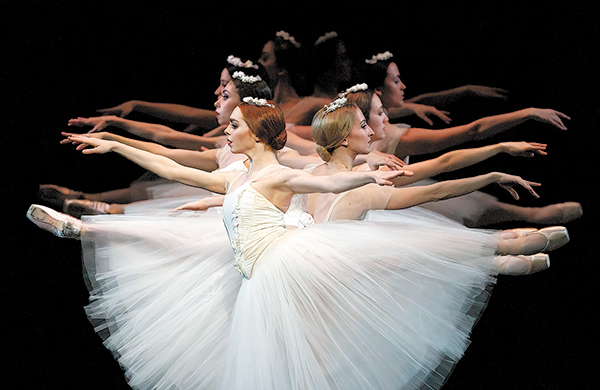American ballet troupe gives classic performance
By Chen Nan | China Daily | Updated: 2023-11-10 14:57

The American Ballet Theatre is staging its version of Adolphe Adams' famous ballet Giselle in Beijing.[Photo provided to China Daily]
The American Ballet Theatre performed its version of Adolphe Adams' famous ballet Giselle on Thursday at the National Centre for the Performing Arts in Beijing in a production that will run until Sunday.
The New York troupe made its first visit to the NCPA in 2009 and returned in 2013. In the decade since, the troupe has won many Chinese fans.
During this tour, they are making headlines with its 10 principal dancers.
"It's so nice for us to come back to Beijing after 10 years. It's a very important time for us to be together, to share our art with people in China. Dance is a universal language, with emotion and passion, with integrity and storytelling. It helps to uplift society. This is something we take great pride in. And we are so honored to be invited to share our beautiful art form," said Susan Jaffe, the group's artistic director, at the NCPA on Wednesday.
The company's highly acclaimed version of Giselle, a classical 19th-century romantic ballet, was first presented in New York in 1940, with choreography by Anton Dolin and scenery and costumes by Lucinda Ballard. The leading roles were danced by Annabelle Lyon and Dolin.
Since then, it has staged six versions of the ballet, which Jaffe says is considered the most romantically classical ballet the company performs. The story follows the romance between Count Albrecht of Silesia and a trusting peasant maid, Giselle, and is one of the most frequently performed productions by ballet companies around the world.
"This version by ABT is straightforward and not complicated, and our dancers are strong, not only technically strong, but also in their storytelling," Jaffe says.
One of the most touching scenes from the ballet is during the second act, when the corps de ballet dance with Giselle.
"Our corps de ballet has the most beautiful version of Giselle. They dance and breath together, which is breathtaking. Whenever I watch them perform at the beginning of the second act of the ballet, I am deeply touched," Jaffe says.
"It's a story about love and forgiveness, which is romantic and beautiful," says James Whiteside, one of the troupe's principal dancers, who plays Albrecht. "I was here performing at the NCPA in 2013. Now, I am very excited to be back with this role, which is definitely one of my favorites."
Fang Zhongjing, one of the company's Chinese dancers, is unable to perform this time because she has injured her foot.
"But I am very happy to return to China with the company," says Fang, who was born in Shanghai, and began her studies at the Shanghai Ballet School where she trained for seven years before attending the Performing Arts College of Shanghai Drama University.
"Last time I performed at the NCPA, I was a member of the corps de ballet and now I am a soloist, which makes me happy and proud. This trip means a lot to me," says Fang.
Chloe Misseldine performs as Myrta, Queen of the Wilis — the ghosts of maidens betrayed by their lovers.
"It's a very powerful character and magical," says Misseldine, who is half Chinese. "It's also demanding for ballerinas because there are many powerful movements."
Before their visit to the capital, the company was in Shanghai as part of their Asian tour. In addition to Giselle, they performed a special set program, Classic Old and New, which consisted of three pieces: Piano Concerto No 1 by Russian composer Dmitri Shostakovich and choreography by Russian choreographer Alexei Ratmansky, Petite Mort by Czech choreographer Jiri Kylian, and Etudes choreographed by Danish dancer and choreographer Harald Lander.
The three pieces, choreographed in 2009, 1991 and 1948, can be viewed as a brief history of the ballet.
























